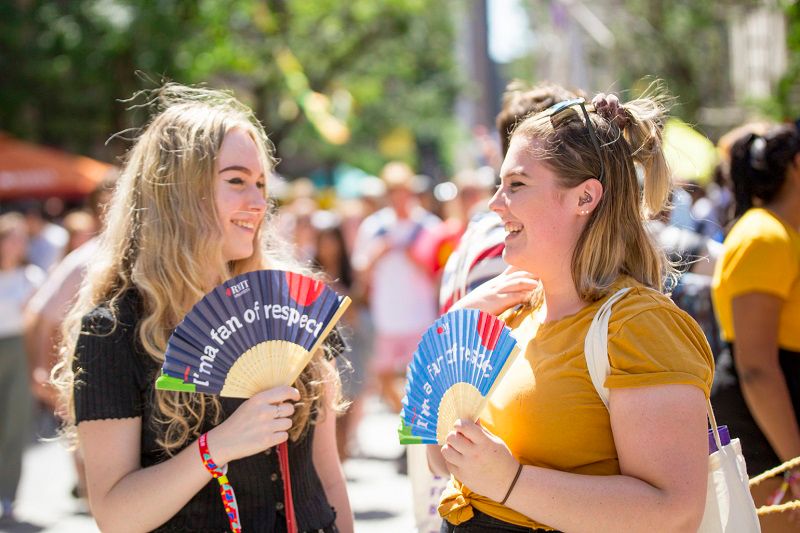
At RMIT, we’re proud of our diverse and inclusive community. We believe everyone deserves to feel safe, respected, valued and treated as an equal in their place of study and work.

We want the RMIT community to be a place where:
At RMIT we define sexual harm as any sexual behaviour that you don’t agree to, or makes you feel uncomfortable or unsafe. It can happen to anyone, and it is illegal.
Since 2016, when the Australian Human Rights Commission first surveyed students about sexual assault and sexual harassment at Australian universities, we’ve worked hard to build a culture of respect and make RMIT a safer place for everyone.
We’ve come a long way – but there is still more to do. And we all have a role to play.
Read our Respect at RMIT Progress Report 2017-2022 (PDF 29 MB).
Read our Addressing Gender-Based Violence Strategic Action Plan 2023-2027 (PDF 19 MB).
Sexual harm and other forms of gender-based violence have no place in the RMIT community.
In 2017, following the Australian Human Rights Commission Report on sexual harm in universities, RMIT, along with many other universities in Australia, made a commitment to take strong action in the prevention of and response to sexual harm.
To create a safer environment, we must understand the gendered drivers of violence. We know that the experience of violence is disproportionately experienced by women and girls and is often driven by gender inequality.
At RMIT we are committed to the elimination of gendered violence.
We also know that members of our LGBTIQA+ community are identified as being at risk of experiencing domestic, family and sexual violence. This is not acceptable to us.
We’ve put in place dozens of initiatives to reduce and prevent sexual harm and to support those affected by it, because one incident of sexual harm is one too many.
To build widespread social and structural change, we are committed to three levels of intervention:
We’ve worked hard to build a culture of respect and make RMIT a safer place for everyone.
Our three-year Be the Change campaign challenged the entire RMIT community to step up and help change the harmful culture of everyday sexism that leads to sexual harm.
Since 2017, RMIT has:
Read our Respect at RMIT Progress Report 2017-2022 (PDF 29 MB).
As part of our commitment to reducing sexual harm, RMIT took part in the 2021 National Student Safety Survey.
The survey gathered information about students’ experience of sexual assault and harassment, on and off-campus across Australia’s universities. The results will give universities insights that will help them drive positive cultural change around reducing sexual harm and, ultimately, create a safer environment for all.
A random selection of RMIT students was among those invited to take part in the survey from 6 September to 3 October 2021. There was also an opportunity for other current students and recent alumni to share their views during the survey period.
Learn more about the National Student Safety Survey.
Support is available to any member of the RMIT community who has experienced sexual harm or has been impacted by sexual harm, no matter where or when this happened.
Our Safer Community team are ready to help. They will believe you, listen to you, and make sure you get the support you need.
Please note that Safer Community is not an emergency service. If you or others feel at risk or consider the situation to be an emergency, call emergency services via 000. If you are on campus, you can also alert campus safety and security on 9925 3333.
Our commitment to preventing sexual harassment and sexual assault, and responding better to those who experience it, is underpinned by our Sexual Harm Prevention and Response Policy.
The policy outlines the responsibilities of staff in promoting a respectful culture at the University. It also reinforces RMIT’s focus on prioritising the wellbeing of staff and students who have experienced sexual harm, and ensuring any trauma associated with disclosing or reporting an incident is minimised.

How we are working to help end disrespect, gender inequality and gender-based violence.
Acknowledgement of Country
RMIT University acknowledges the people of the Woi wurrung and Boon wurrung language groups of the eastern Kulin Nation on whose unceded lands we conduct the business of the University. RMIT University respectfully acknowledges their Ancestors and Elders, past and present. RMIT also acknowledges the Traditional Custodians and their Ancestors of the lands and waters across Australia where we conduct our business - Artwork 'Luwaytini' by Mark Cleaver, Palawa.
Acknowledgement of Country
RMIT University acknowledges the people of the Woi wurrung and Boon wurrung language groups of the eastern Kulin Nation on whose unceded lands we conduct the business of the University. RMIT University respectfully acknowledges their Ancestors and Elders, past and present. RMIT also acknowledges the Traditional Custodians and their Ancestors of the lands and waters across Australia where we conduct our business.